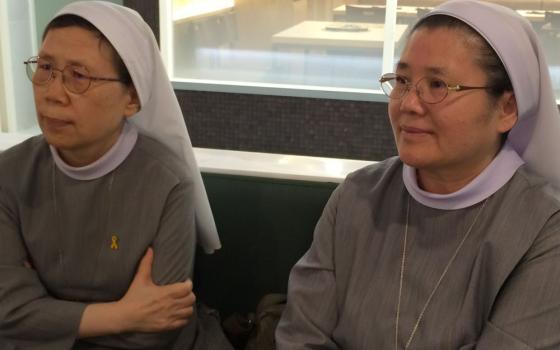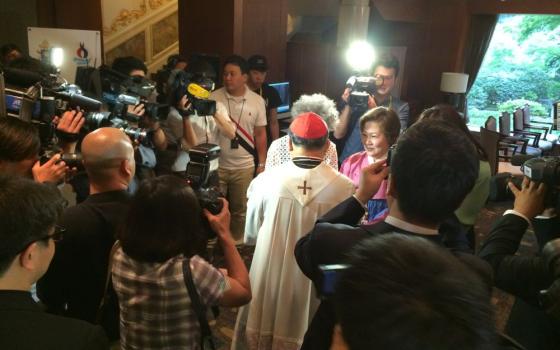Editor's note: For an ongoing list of all coverage of the assembly, go to this series link: LCWR 2014.
The distance from Seoul to Nashville is 6,927 miles, but some “sister sisters” here feel close to Leadership Conference of Women Religious delegates now in the middle of the annual meeting.
As we know, by all appearances, LCWR has to make some tough choices this week. The basic question is how does it respond to a Vatican demand to clear future program speakers and related activities with a Vatican-appointed overseer, Seattle Archbishop Peter Sartain.
I am in Seoul, South Korea, this week speaking to Catholic sisters about their work while keeping one eye on the Pope Francis' five-day pilgrimage, which begins here in a few hours (August 13).
Yesterday I had an appointment to meet two women, members of the Little Servants of the Holy Family, a local congregation, that took the Vatican II call seriously and renewed their congregation’s charter and mission following the council.
Briefly, they went from being “care givers” to “witnesses to the signs of the times,” they told me. It meant giving away their hospital to the Seoul archdiocese. The move gave them new freedom and they have used it to dig deeper into witnessing to the most pressing “justice issues” facing Korean society.
The order is more than 500 strong and they started to live among the poor, especially those being clearly tossed around greed and military forces.
I was to have interviewed Sr. Shin Sook Kang, who directs formation for her congregation, and Sr. Jim Sook Cha, the congregation’s general superior, in a small room on the second floor of the Lotte Hotel here, but the international media took over yesterday and the place turned into a circus.
At one point, while we looking or a few chairs, Seoul archbishop, Cardinal Andrew Yeom Soo-Jung , scurried by, holy water sprinkler in hand, splashing everything in sight. He was, meanwhile, surrounded with a dozen or more men, holding cameras on their shoulders, catching the act, the first associated with the papal trip.
It looked like a scene from a 1950s Fellini movie.
The sisters smiled politely; we sought out a coffee shop on the 13th floor.
Speaking to each other through a translator, we talked about their remarkable work and transformation of mission. Wherever there is social disruption, wherever Koreans are being crushed without voice, you can count on a Little Sister to be there giving them support, comfort and a louder voice.
It wasn’t long, however, before the sisters began talking about what’s going on with the U.S. Catholic sisters and the Vatican. Both Srs. Kang and Cha said they have followed events on the Internet. Both are concerned; both are supportive of LCWR.
They could cite the names, dates and chronology. Clearly this was no passing matter to the women.
They began to ask me what is behind the LCWR investigation and are convinced that the real attackers are the U.S. bishops, with the Vatican to the work on their behalf. They are broadly convinced, they told me, that the U.S. bishops want to domesticate LCWR as a means of making it easier in the future to take congregational properties from the women. They think it’s about money more than doctrine.
I wasn’t about to judge their viewpoint, but recognized they were coming out of their own experiences. So many of Korea’s ills today are traceable to the collusion of a few very rich corporations that work hand in hand with government officials. At least, this is what I have heard in meeting after meeting with activist priests, religious and lay leaders in recent days here.
When I told the sisters that LCWR is meeting this week they looked worried.
After pausing for a bit, Kang said: “I know LCWR faces some tough choices, but I will be very disappointed if they give in to CDF demands.”
She explained, saying LCWR is a prophetic voice not just for the U.S. women but for Catholic sisters around the world.
Kang said that remaining prophetic can mean moving forward alone, adding it is only after some time others catch up and understand what prophecy is all about.
She said LCWR might just have to step out of canonical structures. “It might be for a time and it might be difficult, but it will be necessary,” she said.
She compared LCWR to the prophets of the Bible. “Sometimes you have to suffer,” she said.
“Anyway,” she added, “sisters are not supposed to be inside the hierarchy of the church." By this she meant not being inside the official structures of the church as much as they are to be among the people doing their work.
She explained that this is what her congregation did in the 1980s and since then, she added, some of the Korean bishops call them “fake sisters.”
I told the sisters I would be reporting our conversation while LCWR is meeting and asked them if they wanted to send a message.
At first they said that they wanted to offer a message of support. Then they got more specific. Kang then said I should tell LCWR that the organization's decision would have a personal impact on her life.
“It will affect me,” she said.
“Tell them that I think that LCWR is a breakthrough group," Jin said, "and, as such, it is for all the sisters in the world. It has shown us a way forward, a way to think and to act in a proactive – not reactive way. That’s what I want them to know.”
[Fox is NCR publisher and director of Global Sisters Report. He can be reached at tfox@ncronline.org.]


